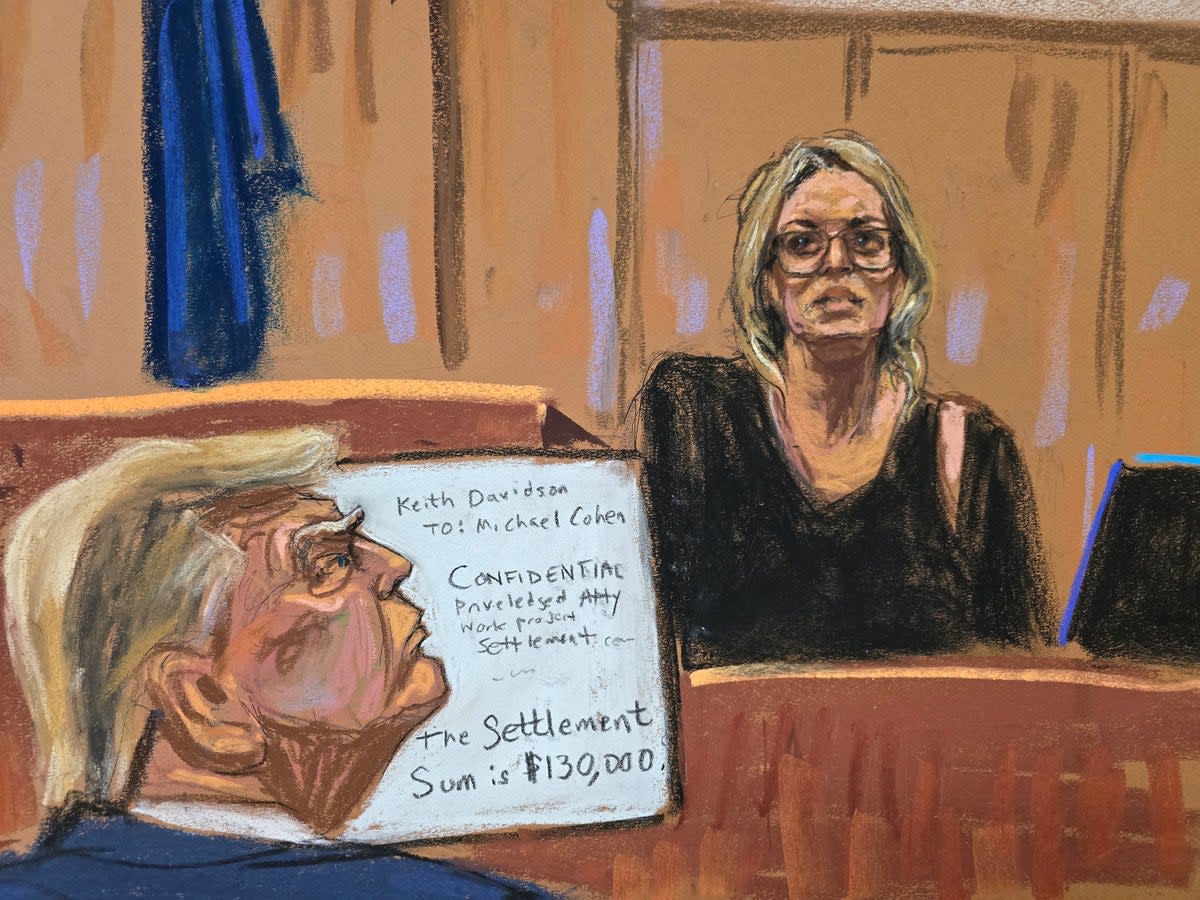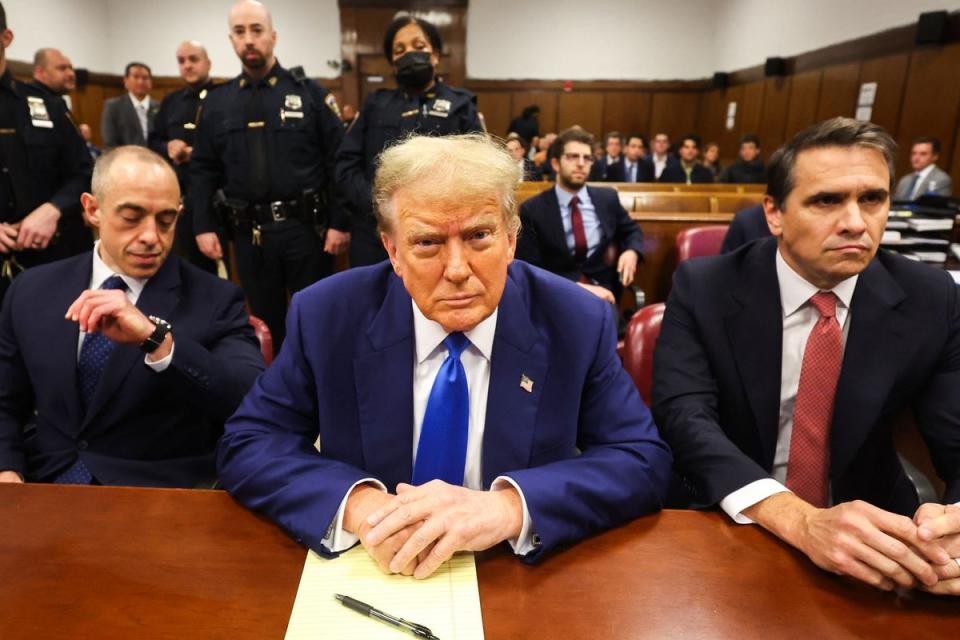Stormy Daniels testifies about alleged affair with Donald Trump in hush money trial

Stormy Daniels entered the witness box on Tuesday at Donald Trump's hush money trial, describing for jurors a sexual encounter the adult film actor says she had with him in 2006, which resulted in her being paid to keep silent during the presidential race 10 years later.
Jurors appeared riveted as Daniels, over the repeated objections of defence lawyers and occasional admonitions from the judge, offered a detailed and at times graphic account of an encounter Trump has denied.
Trump stared straight ahead as Daniels entered the courtroom, occasionally shaking his head and whispering to his lawyer.
The evidence was by far the most-awaited spectacle in the trial.
A courtroom appearance by an adult film actor who says she had an intimate encounter with a former American president adds to the long line of historic firsts in the case, which was already laden with tawdry claims of sex, payoffs and cover-ups.
It is unfolding as the presumptive Republican nominee makes another bid for the White House.
Daniels was allowed to testify despite the repeated objections of defence lawyers, who, after the lunch break, demanded a mistrial for the first time over what they said were prejudicial and irrelevant comments.
"This is the kind of testimony that makes it impossible to come back from," defence lawyer Todd Blanche said.
"How can we come back from this in a way that's fair to President Trump?"
The judge rejected the defence's request.
Daniels' statements are central to the case because, in the final weeks of Trump's 2016 Republican presidential campaign, his then-lawyer and personal fixer, Michael Cohen, allegedly paid Daniels $130,000 (£103,000) to keep quiet about what she says was an awkward and unexpected sexual encounter with Trump at a celebrity golf outing in Lake Tahoe in July 2006.
Trump has pleaded not guilty.

Led by a prosecutor's questioning, Daniels described how an initial meeting at a golf tournament, where they discussed the adult film industry, progressed to a "brief" sexual encounter that she said Trump initiated after inviting her to dinner and back to his hotel suite.
She said she did not feel physically or verbally threatened, though she knew his bodyguard was outside the suite, and there was what she perceived as an imbalance of power: Trump "was bigger and blocking the way".
After it ended, she said, "It was really hard to get my shoes because my hands were shaking so hard."
"He said, 'Oh, it was great. Let's get together again, honey bunch,"' Daniels continued.
"I just wanted to leave."
In the years since the encounter was disclosed, Daniels has emerged as a vocal Trump antagonist, sharing her story in a book and on television and criticising the former president with mocking and pejorative jabs.
But there was no precedent for Tuesday's events when she came face-to-face with Trump and was asked in an austere courtroom setting to describe her experiences before a jury weighing whether to convict a former American president of felony crimes for the first time in history.
Daniels told jurors that she met Trump because the adult film studio she worked for at the time was sponsoring one of the holes on the golf course.
They chatted about the adult film industry and her directing abilities when Trump's group passed through.
The celebrity real estate developer remarked that she must be "the smart one" if she's making films, Daniels recalled.
Later, in an area known as the "gift room", where celebrity golfers collected gift bags and swag, Trump remembered her as "the smart one" and asked her if she wanted to go to dinner, Daniels said.
Daniels said she accepted Trump's invitation because she wanted to get out of a planned dinner with her adult film company colleagues.
She said her then-publicist suggested in a phone call that Trump's invitation was a good excuse to duck the work dinner and would "make a great story" and perhaps help her career.
"What could possibly go wrong?" she recalled the publicist saying.
She said the two saw each other periodically in the ensuing years, when she said she spurned Trump's advances.
She claimed that she learned from her agent in 2011, several years after she and Trump were last in touch, that the story had made its way to a magazine.
She said she agreed to an interview for 15,000 dollars because "I'd rather make the money than somebody make money off of me, and at least I could control the narrative".
The story never ran, but later that year, she was alarmed when an item turned up on a website.
Perhaps seeking to pre-empt defence claims that she was in urgent need of a massive pay-out, Daniels said that she was in the best financial shape of her life, directing 10 films a year, when she authorised her manager to shop her story during the 2016 presidential election cycle.
She said she had no intent of approaching Cohen or Trump to have them pay her for her story.
"My motivation wasn't money," she said. "It was to get the story out," she said.
Evidence has made clear that at the time of the payment to Daniels on October 7 2016, Trump and his campaign were reeling from the publication of the never-before-seen 2005 Access Hollywood footage, in which he boasted about grabbing women's genitals without their permission.
Trump spoke with Cohen and Hope Hicks, his campaign's press secretary, by phone the next day as they sought to limit damage from the tape and keep his alleged affairs out of the press, according to testimony.
Cohen paid Daniels after her lawyer at the time, Keith Davidson, indicated she was willing to make on-the-record statements to the National Enquirer or on television confirming a sexual encounter with Trump.
National Enquirer editor Dylan Howard alerted publisher David Pecker and then, at Pecker's direction, told Cohen that Daniels was agitating to go public with her claims, prosecutors said.
Daniels had previously sought to sell her story to another celebrity gossip magazine, Life & Style, in 2011.
The jury on Monday heard from two witnesses, including a former Trump Organisation controller, who provided a mechanical but vital recitation of how the company reimbursed payments that were allegedly meant to suppress embarrassing stories from surfacing and then logged them as legal expenses in a manner that Manhattan prosecutors say broke the law.
The evidence from Jeffrey McConney yielded an important building block for prosecutors trying to pull back the curtain on what they say was a corporate records cover-up of transactions designed to protect Trump's Republican presidential bid during a pivotal stretch of the race.
It focused on a $130,000 (£103,000) payment from Cohen to Daniels and the subsequent reimbursement Cohen received.
McConney and another witness said that the reimbursement checks were drawn from Trump's personal account.
Yet even as jurors witnessed the checks and other documentary evidence, prosecutors did not elicit testimony on Monday showing that Trump dictated that the payments would be logged as legal expenses, a designation that prosecutors contend was intentionally deceptive.
McConney acknowledged during cross-examination that Trump never asked him to log the reimbursements as legal expenses or discussed the matter with him at all.
Another witness, Deborah Tarasoff, a Trump Organisation accounts payable supervisor, said under questioning that she did not get permission to cut the cheques in question from Trump himself.
"You never had any reason to believe that President Trump was hiding anything or anything like that?" Trump attorney Todd Blanche asked.
"Correct," Ms Tarasoff replied.
The evidence followed a stern warning from Judge Merchan that additional violations of a gag order barring Trump from inflammatory out-of-court comments about witnesses, jurors and others closely connected to the case could result in jail time.
The $1,000 (£797) fine imposed on Monday marks the second time since the trial began last month that Trump has been sanctioned for violating the gag order.
He was fined $9,000 (£7,174) last week, 1,000 dollars for each of nine violations.
Prosecutors are continuing to build toward their star witness, Cohen, who pleaded guilty to federal charges related to the hush money payments.
He is expected to undergo a bruising cross-examination from defence attorneys seeking to undermine his credibility with jurors.
Trump, the Republican Party's presumptive presidential nominee, is charged with 34 felony counts of falsifying business records in connection with the hush money payments but has pleaded not guilty and denied any wrongdoing.
The trial is the first of his four criminal cases to reach a jury.

 Yahoo News
Yahoo News 
